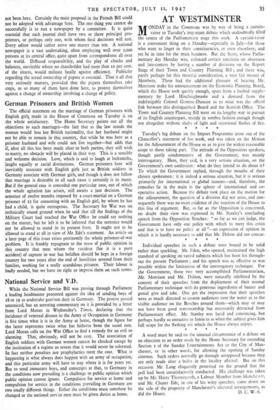German Prisoners and British Women
The official statement on the marriage of German prisoners with English girl% made in the House of Commons on Tuesday is on the whole satisfactory. The Home Secretary points out all the objections to such marriages—the fact that as the law stands the woman would lose her British nationality, that her husband might not be able to remain in this country, that while he was here as a prisoner husband and wife could not live together—but adds that if, after all this has been made clear to both parties, they still wish to marry, no obstacle will be placed in their way. This is a sensible and welcome decision. Love, which is said to laugh at locksmiths, laughs equally at racial distinctions. German prisoners here will inevitably associate with English girls just as British soldiers in Germany associate with German girls, and though it does not follow that marriage is desirable in all such cases it certainly is in many. But if the general case is conceded one particular case, out of which the whole agitation has arisen, still awaits a just decision. The sentence of twelve months imposed by a court-martial on a German prisoner of 22 for consorting with an English girl, by whom he has had a child, is quite outrageous. The Secretary for War was on technically sound ground when he said that till the findings of the Military Court had reached the War Office he could say nothing on the matter, but he left it to be inferred that the sentence would not be allowed to stand in its present form. It ought not to be allowed to stand at all in view of Mr. Ede's statement. An article on a later page of this issue raises pertinently the whole prisoner-of-war problem. It is frankly repugnant to the mass of public opinion in this country that men whom the rccident (for it is a pure accident) of capture in war has befallen should be kept in a foreign country for two years after the end of hostilities severed from their families, working for a really scandalous pittance. Their labour is badly needed, but we have no right to impress them on such terms.


































 Previous page
Previous page